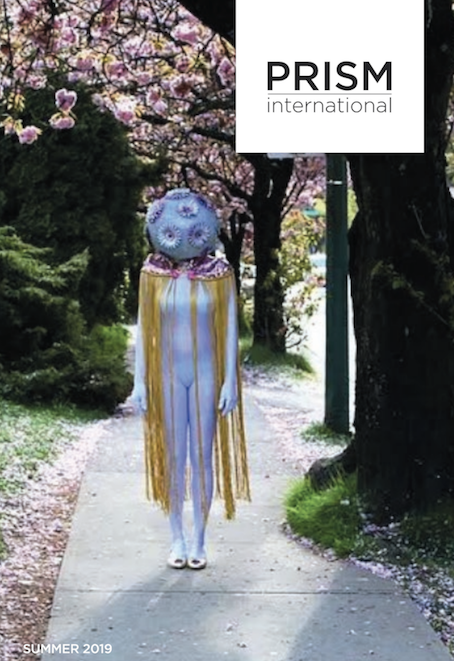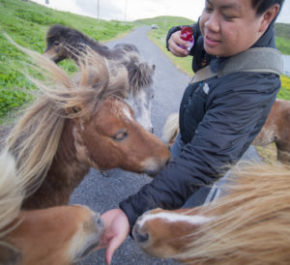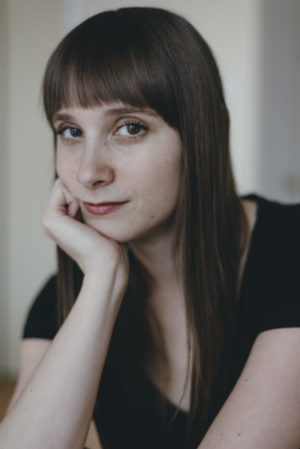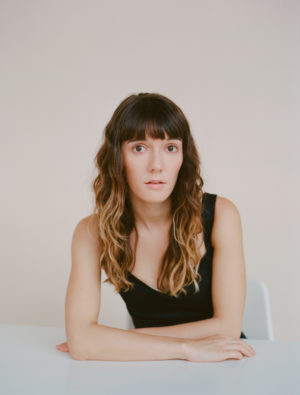
Summer issue cover image: “Other Other” by Gio Swaby
We are delighted to introduce you to our Jacob Zilber prize winners. Two of these pieces appear in our Summer issue, 57.4, while you can read “Toy Wonderland,” by Jenessa Abrams, exclusively on our website later this week. These stories capture heartbreak in painstaking detail—a pink hairbrush, a photograph slipped beneath a pillow, knotted strands of hair. They crackle with blizzards and broken glass, and bloom with Tbilisi roses and revolution. Each of the stories, in different ways, explores the limits of repair.
Grand Prize Winner
Hsien Chong Tan – “The Last Snow Globe Repairman in the World”
Why do you live where you live?
 I’m a settler on the traditional, ancestral, and unceded territories of the Musqueam, Tsleil-Waututh, and Squamish nations, also known as Vancouver. I’m grateful to be in proximity to the mountains, forests, and waters of these lands. Around my South Van neighbourhood, I love the mix of people, shops, and restaurants—Filipino, Indian, Vietnamese, Sri Lankan, Chinese, and Pakistani, among others. To me it feels like home.
I’m a settler on the traditional, ancestral, and unceded territories of the Musqueam, Tsleil-Waututh, and Squamish nations, also known as Vancouver. I’m grateful to be in proximity to the mountains, forests, and waters of these lands. Around my South Van neighbourhood, I love the mix of people, shops, and restaurants—Filipino, Indian, Vietnamese, Sri Lankan, Chinese, and Pakistani, among others. To me it feels like home.
When do you feel most like yourself?
When I’m up in the small hours, reading and sharing the couch with my cats. It’s pretty mundane, I know, but in university and when I used to work nights, I got used to being the only person awake in the apartment. When it’s late enough and still enough, it can feel like the world and all the things it wants have fallen away.
What advice would you give an emerging writer?
I’m not emerged/established/etcetera, so this isn’t so much advice as something I remind myself about constantly: Take the time you need, care about the work and not the other stuff.
That’s not saying anything new or original, but there are so many things to get distracted by—publications, awards, book deals, envy—none of which change whether your own writing is any good.
Do you have any “vices”? What’s the relationship between your vices and your writing?
I’m probably a little too interested in food, so it turns up a lot in my work. Sometimes that can be very literal—I have a story about a man with an artichoke for a heart, and another one about a restaurant for homesick aliens. “The Last Snow Globe Repairman in the World” doesn’t have as much of that going on, but generally there is plenty of eating or being eaten. The story I’m currently working on involves dumplings and a talking frog, so we’ll see where that goes. I hope the frog makes it out in one piece.
First Runner-Up
Cassidy McFadzean – “Victory Day”
 Is there a public space you’re fond of? Describe it.
Is there a public space you’re fond of? Describe it.
In Toronto, there’s a small park wedged between two streets, where there is a plaque and bronze bust of the poet Gwendolyn MacEwen. The park is well cared for, with ever-changing flowers, neatly raked leaves, and an outer rim of trees and benches. When I moved here, life was in a state of turmoil, and MacEwen appeared like a patron saint I envisioned looking over me. I often walked through the park, and would find myself standing before MacEwen’s statue, even for a few seconds, before continuing on my way. Doing so grounded me, and offered a moment of reflection. One morning two months ago, my eyes settled on the inscribed words from a line of MacEwen’s poem “Late Song,” which reads: “nothing ends until we want it to.” Seeing those words, I realized I wanted to stop drinking, and I did.
Do you have a favourite word? Or least favourite word? What is it and why do you like/dislike it?
There is something elemental and resonant in words of Anglo Saxon origin that I use a lot in my poetry, and in my fiction, which tends to be more colloquial (“words in their best order” – Coleridge). The authors of Old English healing charms believed that certain words hold a power, which can be accessed when spoken aloud in a particular order, which is essentially what poetry is (“the best words in the best order”). I’m drawn to archaic and esoteric words for this reason, as well as words that refer to the natural world, which are becoming increasingly obscure. There aren’t many opportunities to use words like feverfew, coney, or soothsayer in daily speech, and I think of my poems as places where these words can live and be preserved.
What makes you nostalgic?
Lately I’ve been experiencing a lot of flashbacks from childhood, simple memories of summers in the backyard. I used to grind lilacs into a “perfume,” make fairy crowns and sceptres in the forests in BC with my brothers, be chased by invented monsters in the yard of our grandma’s red brick house. I am nostalgic for hours spent entertaining myself with nothing but a notebook and a pen, drawing intricate maps of invented landscapes. There is a pleasure in creating for its own sake that I miss as an adult trying to make a living as a writer and that I hope to reclaim, and I think a part of it can be found in hours of boredom when you can give yourself over to the imagination.
What are your current or upcoming projects?
I wrote a poem about a piece of garbage for The Litter I See Project. I usually find it difficult to write from a prompt, but I was happy to discover that writing about a piece of trash was exactly the inspiration I needed. My contribution isn’t online yet, but you can browse the pieces of litter that others have written about.
Second Runner-Up
Jenessa Abrams – “Toy Wonderland”
 What’s the first story or poem you remember writing, and how does it relate to your current work?
What’s the first story or poem you remember writing, and how does it relate to your current work?
I wrote my first poem at age seven. My grandmother Josy gave me a bound green book with lots of famous poems pasted into it. She left about two-thirds of the book blank and instructed me to fill it. The idea that I could have something to say that mattered changed everything. The poem I wrote was about the quiet moments before the sun wakes up. I think it was also about impermanence. That is a subject I keep returning to. How all things are temporary but that doesn’t make us love or hurt any less.
What’s one risk you’re glad you took?
The night after the 2016 election I wrote my first personal essay. Something in me broke once Trump was elected. Writing nonfiction was terrifying, but it also felt incredibly freeing. For the first time, I wasn’t hiding behind anything. The world became more daunting and simultaneously more open.
Tell us about something that brought you joy or made you laugh recently.
I recently learned that at age fifteen, my partner used to enjoy cooking shrimp with almond extract.
(Now he’s a staunch vegetarian who makes a mean French onion soup).
Beyond writing, what are your passions?
Food. Nothing brings me the kind of joy that food does. Particularly anything involving butter, cream and honestly any and all bread products. While I worked on this interview, I made a batch of biscuits. I’m eating one now. The butter is melting beautifully into the dough. Cooking is what I do to get unstuck, in life and in writing. I’m also a huge advocate for mental health awareness. No one should have to live in silence.
Any upcoming projects you want to share?
I’m incredibly excited to have a novella coming out with Platypus Press in August. It’s a story that is close to my heart and it’s exciting to see it in the stand-alone Shorts format.